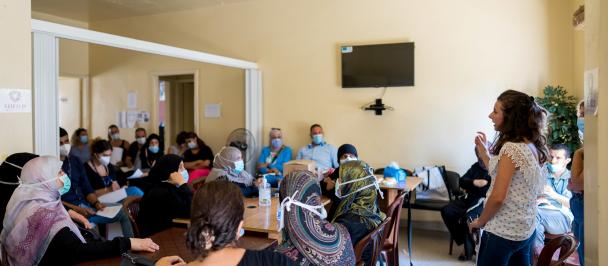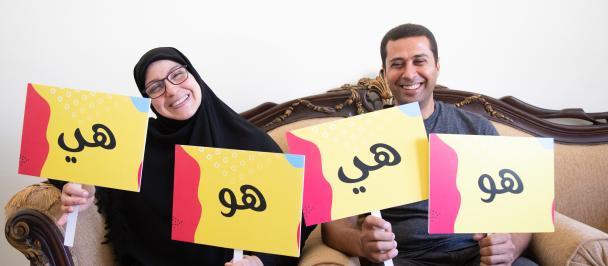International Women’s Day’s Resolution in Lebanon: Pushing Women's Rights to the Forefront
Co-authored: Zeina Merhi & Hussein Bailoun
For Lebanese women - who have for so long fought for their rights - 2020 arrived with hopes that this year, finally, the tide had turned in their favor. More than ever, Lebanese women stand side-by-side, united in their demand for the rights they should have gained long ago. Yet the question remains - will these demands translate into efforts by those responsible of setting women and girls rights at the forefront of their agendas?
For 2020’s International Women’s Day, one resolution prevails as a priority In Lebanon: pushing women's rights to the forefront.
Skimming the landscape: the reality for women
“UNJUST.” A word feminist activist Hayat Mirshad uses to characterize the reality of women and their access to rights in Lebanon. “The perception is that, compared to other countries in the region, given the lifestyle some of us live, Lebanese women enjoy their rights. Yet, this is not the reality. Scratch below the surface and the truth becomes dimmer than the prevailing perception,” explains Mirshad.
Lebanese women have witnessed discrimination for decades. “Norms, patriarchal religious courts, and unjust laws normalize violence against women in Lebanon every day. The enjoyment of rights for women is a constant struggle and cannot yet be described as an entitlement,” Mirshad continues.
Countless cases of violence against women have turned in favor of men due to a "maintained order that, based on a mindset dominated by patriarchy, keeps women in check," she explains. Mirshad is also the Head of Communications and Campaigning at The Lebanese Women Democratic Gathering- RDFL; one of the oldest feminist organizations in Lebanon. The organization aims at achieving gender equality in Lebanon and advocates for women's rights. According to Mirshad the cases RDFL handles today- and after more than 40 years of advocacy for the elimination of all forms of discrimination against women in Lebanon-are “heartbreaking.”
"We are achieving a lot for women's rights through our organization's efforts, yet Lebanon still lags, especially when it comes to rights related to personal issues that are still in the hand of religious courts,” she states.
Frequently, concerns raised by women’s rights activists are disregarded in favor of protecting a status quo dominated by an atmosphere of inequalities. “Inequalities can be seen in how families raise girls as opposed to boys, as well as in schools, in communities, in institutions and everywhere else. It’s a cultural issue, and patriarchy breeds on such a culture.”
Lebanon ratified the UN Convention on the Elimination of All Forms of Discrimination against Women in 1997, yet made reservations on three of its articles (9, 16, & 29). Reservations on article 16 are based on Lebanon’s personal status laws which are handled by religious institutions. This reservation has undermined women’s rights ever since, especially in areas related to children’s custody, marriage and divorce. Reservations on article 9 are associated with Lebanon's policies which oppose the right of Lebanese mothers to grant their children nationality. Also a critical point of advocacy for women rights organizations, as thousands of women and their families in Lebanon suffer from the repercussions of such policies.
“In the face of such systematic discrimination, the solution is solidarity. Women must stand side-by-side and unite around their demands for equality in Lebanon," she concludes. “This is the only way we can work together to pressure decision-makers and religious institutions.”

Rising solidarity in the fight against gender inequality
Lebanese women needed to make their voices heard, and recent protests have provided a channel for many of them. The current protests in Lebanon allowed an increasing number of women to unify around their demands.
“These protests allowed women to raise their voices collectively against the discrimination they face every day,” human rights lawyer Nayla Geagea said. Geagea believes that the past decade has delivered a positive step in the fight for women's rights in Lebanon. In 2014 the parliament passed a law to protect women from domestic violence. The passing of the bill represented a breakthrough following years of advocacy for this law to be adopted.
During recent protests, women united against all forms of violence and discrimination they face. Sexual harassment, in particular, was a form of abuse that captured the protests' headlines.
“There is a growing level of awareness of sexual harassment. This was made clear during the protests since, in Lebanon, we do not see systematic cases of harassment compared to other countries facing similar uprisings,” continues Geagea. “Yet we still lack laws and regulatory mechanisms that punish sexual harassment. Such laws are needed to protect women; in public spaces as well as in institutions and at the workplace. There are numerous laws proposed by women’s rights organizations on this, and we need to push for these.”
Not only the adoption of laws and regulatory mechanisms are required to protect women from violence. In essence, they are also needed in different mediums to ensure women can access opportunities without any fear. Due to systemic practices that intentionally keep them in the shadows, women in Lebanon are still behind on so many accounts. The political spectrum could serve as the best example of this.
"We see women excelling in a variety of industries, in both the public and the private sector. Women are in senior positions and are leading successfully. However, this is not reflected in the political sphere," highlights Geagea. Today, Lebanon’s government includes six women, a record in the country, since the political participation of women in Lebanon has long been limited. In 2018, 113 women registered their names as candidates in the parliamentary elections –also an unprecedented number throughout the country’s history- yet only six women made it to the parliament.
To address this issue, Geagea suggests, “A quota for women’s political participation is required to ensure that women are elected to parliament.”
What about our responsibility as Individuals too?
"Without granting women their rights, nations cannot develop. If you compare countries that have done so to those who haven't, it is clear that those which foster equality among men and women are today leading the world, while others who haven't are still behind," notes Hayat Mirshad.
Lebanese women can only live up to their full potential if enjoyment of rights is facilitated. These rights are the obligation of the state. Yet, individuals too have an essential role to play in fighting discrimination against women and in promoting a culture of gender equality. Equality will only occur when we:
· As parents, raise boys and girls equally and grant them equal life opportunities;
· as colleagues, give women their place in the workplace;
· as family members, we do not judge women’s choices just because they are women;
· as heads of institutions, we ensure policies and regulations address women and men equally;
and the list continues…
With support of its donors, UNDP in Lebanon has long been working with all relevant stakeholders to promote women’s rights and ensure women’s participation in different fields.
Find out what UNDP is doing to promote women’s rights:
Link: http://bit.ly/2RIAIIW
Link: http://bit.ly/2TmKnpo

 Locations
Locations

